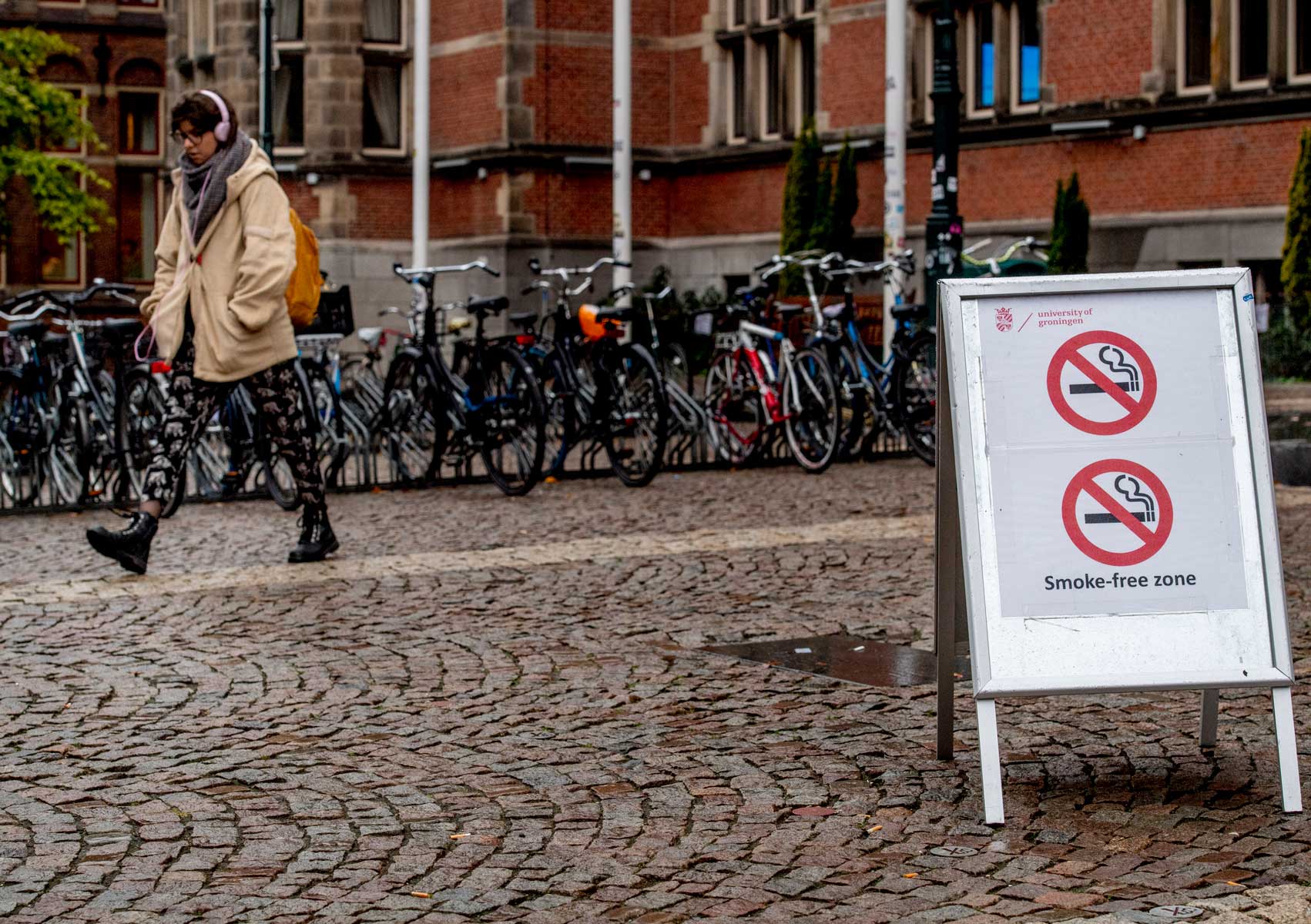Don’t lose sight of the person behind the smoker
Susanne Täuber has previously conducted research into the effect of well-intentioned government campaigns to combat smoking and promote healthy lifestyles. According to Täuber, the government's good intentions primarily lead to divisions. As from 1 August, all of the University’s grounds will be smoke-free. A campaign based on good intentions. However, she believes that the implementation of the campaign may still lead to complicated situations.
Text: Merel Weijer, Communication Office
In 2015, Täuber was awarded a Veni grant for her research entitled ‘The art of Persuasion’, which showed that well-meaning, moral government campaigns are counterproductive because they arouse moral judgements. Positioning healthy living as a moral norm undermines solidarity in society. That particular research project has since come to an end, but the topic continues to be relevant. After all, smoking certainly hasn’t gone away and not everyone has a satisfactory BMI between 18.5 and 24.9. But how can you tackle this issue without labelling people who smoke or are too overweight as inferior?

The problems
Not by pointing a patronising finger or excluding these people from the public domain, says Täuber. But that is exactly what is going to happen now. As from 1 August, smoking will no longer be allowed on University grounds. Most organizations think that it’s done and dusted once they’ve introduced a measure like that, but actually, that’s when things really get started. Administrators may encounter difficulties when implementing this policy. ‘One problem, for example, is that it is sometimes difficult to come up with alternatives. For instance, when the Zernike Campus is declared entirely smoke-free, because providing smoking areas is also seen as facilitating smoking, smokers will have to leave the site altogether. And surely that’s not what you want,’ says Täuber.
Double standards
Making Groningen smoke-free is a good initiative, says Täuber, but if you actually look at who smokes, you will find a disproportionate number of people from a low socio-economic status group. ‘So, what you’re saying between the lines is that poor people in Groningen are no longer allowed to participate. We have to keep them out of the city. And that’s not what you want.’
According to Täuber, a better approach would be to consider smokers as people with an addiction. ‘I think it’s incredibly unfair for a government to sell things that are addictive and then to say to those addicted people: “You’re not allowed to participate anymore”.
The government employs double standards by, on the one hand, levying excise duty and filling the state coffers and, on the other hand, saying: smoking is not allowed. In Täuber’s opinion, the government should actually say: we facilitate that addiction, so we should also help those people to stay healthy or kick the habit. This would also go some way towards making the government seem less hypocritical.

I smoke but I don’t bite
Täuber fully supports the decisions that are being made regarding the smoking policy, but believes that you can't treat people who are addicted like pariahs. You have to find a suitable way to reach them – so, not from above – and there has to be mutual respect. So, don’t say: You’re not allowed to smoke anywhere anymore, so you’ll just have to figure it out. Instead, you have to work with smokers to find a solution. Täuber cites the anti-smoking campaign launched by, among others, the Municipal Health Service (GGD) and the Aletta Jacobs School of Public Health as a good example of how things can be done. The slogan is: I smoke but I don’t bite. She believes that this approach will help people to not lose sight of the individual behind the smoker and will encourage people to keep talking to each other.
We all have our own bubbles
The fact that we are not especially adept at leaving our own bubbles plays a major role, according to Täuber. Health professionals and municipal officials both have good intentions. But, Täuber explains, they often don’t fully realize that they belong to a different group than the one they want to address regarding their health behaviour. They are seen as a group that has more power, and that power is often perceived as threatening. ‘Then you get reactions like: “Who are you to tell me what to do? You have no idea about my life and my problems, and you then you tell me that I have to cook healthy meals every night? I don’t even know how I’m going to manage to pay the rent!”.’
Crawl on your stomach for healthy porridge
Shouldn’t the government just take responsibility and make sure that the products are no longer available, instead of placing the responsibility on citizens not to buy them? Täuber completely agrees. She explains: ‘When the government says that every citizen is responsible for their own health, what you often see is that people automatically start thinking that smokers or people who are overweight only have themselves to blame. The government then relinquishes its responsibility and is able to say in a legitimate way: We don’t care. We’re not going to regulate food supply, just figure it out yourself.’ This has had a number of consequences, for example, the relaxation of the sugar policy in Europe. There are many more cheap products that contain too much sugar. People are left to their own devices to filter out the good products from that huge supply.
Täuber gives an example: ‘If I want to eat porridge –- the regular, no-frills oats –- I practically have to crawl on my stomach to reach it at the bottom of the shelf.’

Normal is always the normal of the people with power
I ask her if she expects the government to launch more healthy-lifestyle campaigns as a result of the coronavirus. She agrees immediately. But to this end, she is not so much concerned about the campaign as about the message. ‘If the campaign says that a lot of people in intensive care are overweight, then there is an implicit apportionment of blame and I don’t think that’s always justified. And that won’t achieve anything. Again, not everyone is able to minimize their health risks by improving their lifestyle. I sincerely hope that these insights are filtering through into the recommendations regarding the coronavirus, but I won’t hold my breath. I fear that it won’t be long before things return to normal, and normal has always been the normal of the people with power.’
More news
-
15 September 2025
Successful visit to the UG by Rector of Institut Teknologi Bandung
